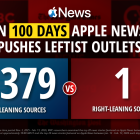Sources claim that the Democratic National Committee ("DNC") directly lobbied Facebook to police the platform for “malicious actors” and “disinformation” from politicians.
The DNC CEO Seema Nanda reportedly wrote the Nov. 21 letter to Facebook to “raise concerns about the company's ability to catch online trolls” and in hopes that the company would “change its political ad policy,” according to CNN.
One excerpt of the letter reportedly obtained by CNN appeared to condemn Facebook’s free speech policy towards political campaign ads and warned that Facebook’s ad targeting a capabilities were a dangerous power in the hands of bad actors.

“Current Facebook policy allows politicians to place demonstrable lies in front of voters via paid ads,” Nanda reportedly wrote. “This type of elite disinformation, from politicians many voters trust, is one of the most insidious and damaging forms of disinformation. Facebook's advanced analytics and targeting capabilities, furthermore, allow candidates to direct disinformation at the populations most susceptible to it.”
The caveat, however, is that "Banning political ads or severely inhibiting targeting capabilities on Facebook would not be in our party's best interest” Nanda reportedly wrote, “nor in the best interest of promoting voter participation.”
The letter also reportedly claimed that an in-house team at the DNC had uncovered “at least nine foreign, inauthentic account networks targeting Americans with anti-Democratic false news content."
These “foreign, inauthentic account networks” allegedly "have the effect of warping the political perceptions of American voters and hurting Democratic candidates' electoral chances."
[ads:im:1]
On Dec. 4, The Washington Post reported that four anonymous sources had come forward, claiming that “Facebook has weighed whether to label political ads to indicate they have not been fact-checked, rather than vetting what candidates say, one of a series of proposals the company has floated” leading up to the 2020 election.
Other proposals being considered, according to the anonymous sources, include “limiting the number of ads a single candidate can run at a time” and “requiring campaigns to have or share authoritative backup documentation for claims made in ads.”
The four anonymous sources also alleged that Facebook has been mulling over these ideas amidst conversations with both Republican and Democratic operatives this past November. Facebook spokesman Andy Stone reportedly commented in a statement: "As we’ve said, we are looking at different ways we might refine our approach to political ads.”
Will Facebook cave to liberal pressure and backslide? The answer as of yet is unclear.
[ads:im:2]









